|
|
|
Sort Order |
|
|
|
Items / Page
|
|
|
|
|
|
|
| Srl | Item |
| 1 |
ID:
069834
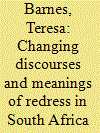

|
|
|
| 2 |
ID:
106092
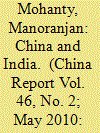

|
|
|
| 3 |
ID:
146875


|
|
|
|
|
| Summary/Abstract |
Drawing upon the concepts of framing theory, this article explores, through close textual scrutiny, how two leading Bangladeshi newspapers have approached the issues of climate justice while covering three major climate summits, Bali 2007, Copenhagen 2009 and Durban 2011. The analysis reveals significant shifts in the treatment of issues related to climate justice by Bangladeshi journalists. Earlier coverage framed the problems mainly in terms of compensatory and distributive justice, but by 2011 disappointment, lost hopes and the need for activist movement are more prominent. The final analysis identifies important tensions between international developments and local engagement and perceptions, indicating that national and even local developments to address climate change problems in Bangladesh seem set to become more prominent news items in future.
|
|
|
|
|
|
|
|
|
|
|
|
|
|
|
|
| 4 |
ID:
163553
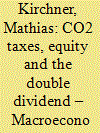

|
|
|
|
|
| Summary/Abstract |
This paper investigates the impacts of CO2 tax schemes on CO2 emissions, equity and macroeconomic indicators in Austria with the macroeconomic model DYNK[AUT]. Our scenarios focus on non-ETS CO2 emissions and comprise different tax rates and revenue recycling options (lower labor taxes, lower VAT and lump sum payments). The short-term comparative scenario analysis indicates that CO2 taxes without recycling lead to significant CO2 emission reductions at moderate economic costs. Equity impacts on households depend on the indicator used but can be regressive without recycling. Most recycling schemes can achieve a double dividend, i.e. emission reductions and increases in GDP. Lump sum payments are less efficient than reducing the VAT or labor taxes. Equity impacts are progressive with lump sum payments, rather proportional with lower VAT and regressive with lower labor taxes. A combination of recycling schemes and/or a restriction of lump sum payments to lower income households can minimize the trade-off between equity and efficiency. Our simulations suggest that well-designed CO2 tax schemes could be a crucial and socially acceptable element within a comprehensive policy package to achieve GHG emission targets for non-ETS sectors in Austria.
|
|
|
|
|
|
|
|
|
|
|
|
|
|
|
|
| 5 |
ID:
183147


|
|
|
|
|
| Summary/Abstract |
International climate negotiations occur against the backdrop of increasing collective risk: the likelihood of catastrophic economic loss due to climate change will continue to increase unless and until global mitigation efforts are sufficient to prevent it. We introduce a novel alternating-offers bargaining model that incorporates this characteristic feature of climate change. We test the model using an incentivized experiment. We manipulate two important distributional equity principles: capacity to pay for mitigation of climate change and vulnerability to its potentially catastrophic effects. Our results show that less vulnerable parties do not exploit the greater vulnerability of their bargaining partners. They are, rather, more generous. Conversely, parties with greater capacity are less generous in their offers. Both collective risk itself and its importance in light of the recent Intergovernmental Panel on Climate Change report make it all the more urgent to better understand this crucial strategic feature of climate change bargaining.
|
|
|
|
|
|
|
|
|
|
|
|
|
|
|
|
| 6 |
ID:
192826
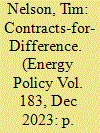

|
|
|
|
|
| Summary/Abstract |
This research advances knowledge regarding social equity as it relates to electricity network charges, renewable investments, and household income. While much research has examined social equity issues related to electricity access, research has yet to fully explore how different network tariff designs used to recover the cost of renewable energy investments, such as those related to ‘Contracts-for-Difference’ (CfDs), impact low-income individuals. We accordingly examine CfDs in more detail, assessing if regressive effects emerge from levying CfD cost recovery via network charges. By analysing energy use and network design charges in Australia, we find that CfDs are a regressive form of taxation used by state governments to fund renewable energy commitments. We illustrate the impact that CfDs have on different energy users and provide recommendations to reform renewable energy policies to provide greater social equity.
|
|
|
|
|
|
|
|
|
|
|
|
|
|
|
|
| 7 |
ID:
191179
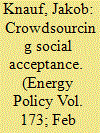

|
|
|
|
|
| Summary/Abstract |
Citizen co-investment in wind energy projects has recently received a lot of attention among scholars and policymakers as a way to finance renewable energy projects and increase community acceptance of these projects. Citizen co-investment refers to the process by which members of the local community can financially participate in renewable energy projects prior to or shortly after construction. While previous research has often been cross-sectional and focused on the preferences of citizen-investors, this paper focuses on the perspective of project developers and asks why, when and how they offer citizens the opportunity to co-invest in wind farms. The work is based on the analysis of fourteen in-depth interviews with a sample of experienced German wind energy developers. The analysis shows that the decision to offer co-investment is driven by citizen demand and local stakeholder preferences, rather than financial needs. We shed light on how experienced developers deal with key trade-offs in terms of the timing of their offering and the choice of capital structure. As a result, we offer a number of testable propositions for further research on the nuanced relationship between citizen co-investment and social acceptance and derive recommendations for policymakers.
|
|
|
|
|
|
|
|
|
|
|
|
|
|
|
|
| 8 |
ID:
101418
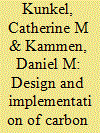

|
|
|
|
|
| Publication |
2011.
|
| Summary/Abstract |
An important concept in discussions of carbon management policies is cap and dividend, where some fraction of the revenues of an auction on emission allowances is returned to citizens on an equal per capita basis. This policy tool has some important features; it emphasizes the fact that the atmosphere is a common property resource, and it is a highly transparent measure that can be effectively used to protect the income of low-income individuals. In this paper we examine this policy in the California context, and focus on the costs and impacts of a cap and dividend scheme when applied to carbon emissions associated with electricity, natural gas and transportation services. We find that cap and dividend can effectively be used to address the economic impacts of carbon management policies, making them progressive for the lowest-income members of society. We find that the majority of households receive positive net benefits from the policy even with the government retaining half of the auction revenue. If auction revenues are instead dedicated only to low-income households, the majority of low-income households can be fully compensated even with the state government retaining upwards of 90% of auction revenues for other purposes.
|
|
|
|
|
|
|
|
|
|
|
|
|
|
|
|
| 9 |
ID:
180098
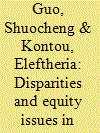

|
|
|
|
|
| Summary/Abstract |
The path towards light-duty vehicle electrification promises benefits like lower costs for drivers and reduced environmental externalities for all. Incentives such as electric vehicle rebates assist with alleviating high capital costs of alternative fuel cars. We uncover distributional effects of plug-in electric vehicle rebates, focusing on a program in the State of California. We use economic attributes representative of populations of census tracts as well as data on rebates distributed to plug-in electric vehicle buyers through the Clean Vehicle Rebate Project from 2010 to 2018. Horizontal and vertical equity measures are evaluated, while measurement of spatial association characterizes spatial patterns of rebates allocation across the State. We evaluate the distributional fairness of rebates allocation between income groups and disadvantaged communities. We find that rebates have been predominantly given to high income electric vehicle buyers. However, the share of rebates distributed to low-income groups and disadvantaged communities increased over time and after an income-cap policy was put into effect. Spatial analysis shows high spatial clustering effects and rebates concentration in major metropolitan regions. We reveal neighborhood effects: communities with lower median income or disadvantaged receive higher rebate amounts when these are geographic neighbors to clusters characterized as high rebate amount receivers.
|
|
|
|
|
|
|
|
|
|
|
|
|
|
|
|
| 10 |
ID:
183573
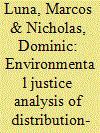

|
|
|
|
|
| Summary/Abstract |
A growing body of research shows that natural gas leaks at the distribution level are much more common and extensive than previously thought. Although scholars and advocates have raised alarms about the climate change and economic significance of these leaks, there has been little consideration of the problem from an environmental justice perspective. Using recently available high resolution leak data, this analysis of natural gas leaks across the state of Massachusetts shows that People of Color, limited English speaking households, renters, lower income residents, and adults with lower levels of education are disproportionately exposed to natural gas leaks and that their leaks take longer to repair, as compared to the general population, and particularly as compared to White residents and to homeowners. This pattern is evident for all leaks in the state, for leaks disaggregated by leak class or grade, and for leaks disaggregated by utility. This analysis shows that natural gas leaks are an environmental justice issue warranting further study and policy attention.
|
|
|
|
|
|
|
|
|
|
|
|
|
|
|
|
| 11 |
ID:
190602
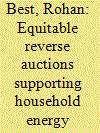

|
|
|
|
|
| Summary/Abstract |
A major challenge faced by policymakers has been determining appropriate subsidy amounts for household energy investments. This can result in inequitable support being either insufficient or excessive. Equitable reverse auctions offer a novel approach to address these issues. Households can bid an amount as a subsidy from the government that they require to go ahead with an energy investment. The lowest bids are successful in a reverse auction, allowing for cost-effective government support. The novel part is the pursuit of equity, as these auctions can occur separately for a pre-determined number of carefully chosen socio-economic groups. Equitable reverse auctions would lower inequality by design, relative to a common benchmark of equal subsidies, for a given government budget and environmental outcomes. Compared to a standard reverse auction, an equitable reverse auction will have greater equality by design but lower cost-effectiveness. However, the design of equitable reverse auctions is cost-effective within each socio-economic group. Non-additional subsidy spending would be reduced through reverse auctions. Equitable reverse auctions would be flexible to fit circumstances across countries, time, and technologies.
|
|
|
|
|
|
|
|
|
|
|
|
|
|
|
|
| 12 |
ID:
125662
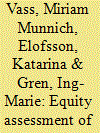

|
|
|
|
|
| Publication |
2013.
|
| Summary/Abstract |
Large emissions of greenhouse gases are expected to cause major environmental problems in the future. European policy makers have therefore declared that they aim to implement cost-efficient and fair policies to reduce carbon emissions. The purpose of this paper is to assess whether the cost of the EU policies for 2020 can be reduced through the inclusion of carbon sequestration as an abatement option while equity is also improved. The assessment is done by numerical calculations using a chance-constrained partial equilibrium model of the EU Emissions Trading Scheme and national effort-sharing targets, where forest sequestration is introduced as an uncertain abatement option. Fairness is evaluated by calculation of Gini-coefficients for six equity criteria to policy outcomes. The estimated Gini-coefficients range between 0.11 and 0.32 for the current policy, between 0.16 and 0.66 if sequestration is included and treated as certain, and between 0.19 and 0.38 when uncertainty about sequestration is taken into account and policy-makers wish to meet targets with at least 90 per cent probability. The results show that fairness is reduced when sequestration is included and that the impact is larger when sequestration is treated as certain.
|
|
|
|
|
|
|
|
|
|
|
|
|
|
|
|
| 13 |
ID:
196925


|
|
|
|
|
| Summary/Abstract |
Many energy efficiency and decarbonization retrofit programs aim to alleviate energy poverty by targeting low-income households, but these programs do not always address the multiple determinants of energy poverty. This study develops a vulnerability-based framework to explore the extent to which energy retrofit programs designed for low-income households comprehensively account for socioeconomic, demographic, and cultural structures that shape energy poverty experiences, employing Canada as an empirical case study using key informant interviews with program administrators. The framework conceptualizes energy poverty as the vulnerability to future housing-related harms, amplified by energy-related risk factors, and conditioned by a household's inability to adequately respond. The study finds several key issues limiting the capacity of low-income retrofit programs to address the overlapping and compounding determinants of energy poverty, including inadequate funding, exclusion of the poorest quality housing, limited retrofit options, and a narrow focus on energy efficiency gains. This study shows key opportunities to expand and deepen the current ecosystem of low-income retrofit programs by expanding existing policy innovations. The paper also offers suggestions for widening the policy arena to address energy poverty, both within retrofit programs and beyond.
|
|
|
|
|
|
|
|
|
|
|
|
|
|
|
|
| 14 |
ID:
163538
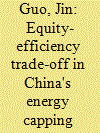

|
|
|
|
|
| Summary/Abstract |
As a part of the transition to a sustainable economy, China has set a cap on primary energy consumption for the first time, of 5.0 billion tonnes of standard coal equivalent by 2020. However, there is a debate on the cap feasibility and failure to adequately address the underlying equity-efficiency trade-off, which hampers achievement. This paper identifies some key challenges ahead, including the coal-dominant energy mix, declining financial support, inconsistent central-local goals, rising costs of energy-saving measures and quality of energy statistical data. By quantifying the preference of each providence toward equity-based or efficiency-based allocation schemes, the great disparity among provinces is revealed and the equity-efficiency trade-off relationship is confirmed. Developing regions, primarily located in central and western areas, tend to favor equity-based disaggregating schemes. Contrarily, developed coastal provinces strongly favor efficiency-based schemes. The present national disaggregation schemes are mainly based on historical energy consumption, but disregard the provincial development gap and efficiency factors. We conclude that this ambitious goal is likely within reach, but increased efforts and flexible instruments are needed.
|
|
|
|
|
|
|
|
|
|
|
|
|
|
|
|
| 15 |
ID:
179869


|
|
|
|
|
| Summary/Abstract |
American politicians repeatedly and strenuously invoke concerns about fairness when pitching their trade policies to their constituents, unsurprisingly since fairness is one of the most fundamental and universal moral concepts. Yet studies to date on public opinion about trade have not been designed in such a way that they test whether fairness is important, nor whether the mass public applies fairness standards impartially. Drawing on findings in social psychology and behavioral economics, we develop and find evidence for an “asymmetric fairness” argument. In a national survey of Americans, we find strong evidence that fairness, conceived in terms of equality, is crucial for understanding support for potential trade deals and support for renegotiating existing ones. Americans view as most fair and most preferable outcomes in which concessions and benefits are equal across countries, especially when those equal benefits match productivity. However, we find that Americans have an egoistically biased sense of fairness, responding particularly negatively to any outcome that leaves the United States relatively worse off—a sense of injustice that does not extend to the same degree to relative gains for Americans.
|
|
|
|
|
|
|
|
|
|
|
|
|
|
|
|
| 16 |
ID:
180238


|
|
|
|
|
| Summary/Abstract |
Anthropogenic climate change has emerged as the most disruptive socio-political issue in the last few decades. The Kyoto Protocol’s failure to curb the rising greenhouse gases emissions pushed the UNFCCC-led negotiations towards a more flexible, non-binding agreement at the Paris COP21 meeting in 2015. The Paris Agreement’s hybrid approach to climate change governance, where flexible measures like the nationally determined commitments are balanced against the ambition of limiting the global temperature within the two-degree range, ensured the emergence of an increasingly complex and multi-stakeholder climate change regime. The article outlines the roadmap of the transition from the top-down approach of Kyoto Protocol to the legally non-binding, bottom-up approaches adopted for the post-Paris phase. The article outlines the post-Paris developments in international climate politics, which hold long-term geopolitical and geoeconomic implications. The article focuses on the fundamental shifts and balances within the UNFCCC architecture and examines the four fundamental features of this transition—the interpretation of differentiation and common but differentiated responsibilities, the evolving role of emerging economies in the negotiations, the rising profile of non-party stakeholders in shaping the climate action strategies and the emergence of climate justice movements as an alternate site of climate action.
|
|
|
|
|
|
|
|
|
|
|
|
|
|
|
|
| 17 |
ID:
106643
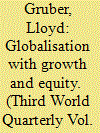

|
|
|
|
|
| Publication |
2011.
|
| Summary/Abstract |
As plentiful and productive as recent empirical work has been, we still know very little about globalisation's long-run impact on economic development. This is only partly because of data limitations. At least as important, this article suggests, have been theoretical limitations: economists and political scientists have yet to resolve a number of key conceptual points. This article brings these remaining theoretical puzzles to the surface, starting with the link between openness and growth. It then turns to the relationship between trade and inequality. Both links-the one from trade to growth, the other from trade to inequality-have been subjects of heated debate among development economists. By contrast, the main focus of this article is the relationship between these two strands of research. How growth and equity interact is a theoretical puzzle which, though no less basic than the others, has to date received far less attention. The article concludes by laying out a back-to-basics research agenda for future-oriented globalisation research in which this growth/equity trade-off is restored to its rightful place at the theoretical centre of the wider development literature.
|
|
|
|
|
|
|
|
|
|
|
|
|
|
|
|
| 18 |
ID:
099617
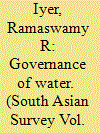

|
|
|
|
|
| Publication |
2010.
|
| Summary/Abstract |
The term 'water governance' encompasses a wide range of issues of water policy, management, sharing, rights, conflicts, social justice and equity, conservation, sustainability and so on; and almost all of them involve legal questions. This article provides a broad overview, both explanatory and prescriptive, of some of the legal issues relating to water. These will include the question of ownership of water; the relationship between the state and civil society; the doctrine of public trust; the distinction between the right to water (that is, water as life-support) and water rights (use rights such as for agriculture, industry, etc.); water-related disputes of all kinds (including river water disputes) and the principles, entitlements, relative priorities and institutional arrangements needed for avoiding or resolving them; water markets and the question of privatisation of water; the regulation of water use in the interest of equity, social justice, harmony and sustainability and so on.
|
|
|
|
|
|
|
|
|
|
|
|
|
|
|
|
| 19 |
ID:
170179
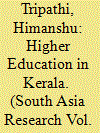

|
|
|
|
|
| Summary/Abstract |
Kerala’s advanced position in terms of literacy levels, educational achievements and other social indicators is well known. However, regarding higher education, the state displays less impressive development. The article first provides a brief overview of Kerala’s school education scenario as a base for higher education and then examines issues of access and equity related to higher education in Kerala. The findings suggest that four socio-economically backward northern districts of the state, partly facing a vicious circle of poverty and illiteracy, appear to be responsible for holding the entire state back in the rankings of present development indicators. A set of recommendations to strengthen the access and equity pillars of higher education in Kerala concludes this article, together with some comments on the relevance of vocational rather than purely academic education.
|
|
|
|
|
|
|
|
|
|
|
|
|
|
|
|
| 20 |
ID:
104898
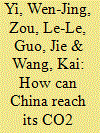

|
|
|
|
|
| Publication |
2011.
|
| Summary/Abstract |
In late 2009, the Chinese government committed to cut its carbon dioxide emissions per unit of gross domestic product (GDP) by 40% to 45% of 2005 levels by 2020. This has raised the issue of how to allocate the CO2 reduction target regionally to meet the national reduction target. To meet this objective, the following aspects may be taken into consideration: equity principles, 'common but differentiated responsibilities'; intensity reduction target fulfillment; and economic difference and reduction potential among provinces. This paper selects per capita GDP, accumulated fossil fuel related CO2 emissions and energy consumption per unit of industrial added value as indicators for emission reduction capacity, responsibility and potential, respectively. Based on these three indicators, a comprehensive index is developed and an intensity allocation model constructed. As decision makers may have different preferences when allocating the reduction burden, we allocate different weights to the indicators, analyzing the results using cluster analysis. The following aspects may also be considered together with the national regional development strategy to determine how to share the burden: the reduction potential of various regions; implementation potential of the plans; and promotion of a highly efficient low carbon economic development model.
|
|
|
|
|
|
|
|
|
|
|
|
|
|
|
|
|
|
|
|
|